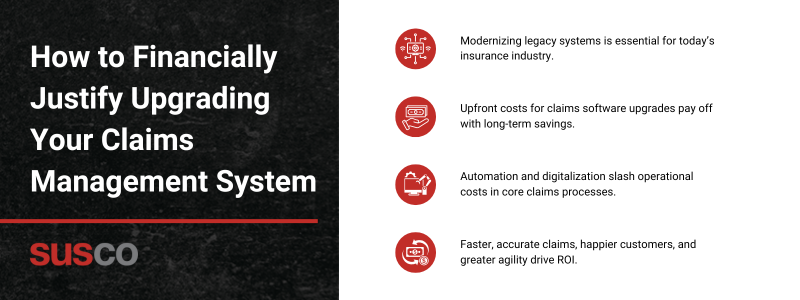Build an ironclad business case for modernization by demonstrating the financial benefits of claims upgrade.

Suppose you’re like most forward-thinking independent adjusting (IA) firms’ IT executives. In that case, you understand that aging claims management systems (CMSs) aren’t just a technology problem but a significant financial burden that grows heavier each year. Maintaining these systems drains up to 80% of IT budgets as technical debt accumulates. Their manual, paper-based tasks and processes also considerably hinder efficiency and increase operational costs.
Given these drawbacks and the financial benefits of claims upgrade, it’s understandable that you’re considering IT modernization. But there’s a hurdle to overcome—gaining stakeholder buy-in. You need a solid business case that will have the finance department happily tapping into its wallet even with a tight budget or competing priorities. This article covers how to justify upgrading your CMS and future-proof operations.
Cost-Benefit Analysis of Upgrading
Let’s cut straight to the chase: upgrading your claims management system requires significant upfront investment. In addition to the immediate expense of building the new system, integrating it with your other systems, and migrating data, there will be software licensing, training, change management, and other costs.
Your first step should be to break down these expenses into categories to clarify where every dollar will go. Once that’s done, determine long-term cost savings from claims software upgrades to strengthen your case. Depending on your situation, these must be demonstrated with specific figures, such as:
- 50% decrease in IT maintenance costs
- 60% reduction in paper-based processing expenses.
- 45% reduction in error-related costs
- 35% reduction in claim processing time.
- 33% reduction in infrastructure cost through cloud deployment.
Remember, while the modernization initiatives are costly initially, persisting with legacy systems is far more expensive in the long run. And that’s what your CFO needs to hear.
Reducing Operational Costs with Modern Systems
Reducing operational costs is vital for any organization, making modernization a compelling strategy. An IA firm can achieve this by minimizing manual tasks and paper-based processes, improving data quality, eliminating multi-keying and redundant systems, unlocking staff efficiency, and keeping pace with business growth.
Therefore, your business case must examine operation gaps and how automation and digitalization can streamline work.
Take a moment to reflect on the current process. How many times do adjusters enter the same information into different systems? How many hours do they spend on average handling mundane tasks? How many human-attributed errors do you experience on average? What happens when there’s a surge in claims? Are you able to scale operations on demand effectively?
A modern CMS reduces operational costs by allowing:
- Automatic document classification and data extraction.
- Intelligent claim routing based on complexity and adjuster expertise.
- Automated status updates and workflows.
- Paperless processing from first notice of loss (FNOL) to settlement.
- Easy integration between different platforms and tools for real-time communication and collaboration.
- Real-time fraud detection and risk assessment.
- Consistent and correct application of policy terms and conditions.
- Higher quality, validated, error-free data input, and much more.
By automating and digitalizing claims processing, the firm spends less time and money on each claim while processing it accurately and without bias. As a result, there are fewer complaints and less reprocessing of settled claims.
You can use cost savings from claims software upgrades to boost profits, beat inflation, or pass them on to carriers to show them how much you value their business. Highlighting these financial benefits can further strengthen your business case.
ROI of a Modern Claims Management System
As discussed in the previous section, automation and digitalization of core claims processes lead to faster, more accurate resolutions—critical factors for customer satisfaction. As you’re likely aware, today’s customers demand consistent, fast, and responsive resolution every time. When claimants receive fair compensation promptly, they are less likely to complain to the carrier, who is less likely to ask you to reprocess the claim. A modern CMS helps you maximize ROI by eliminating leakages and reworks associated with manual errors.
At the same time, it can help you leverage advanced analytics to glean meaningful insights about claim trends and operations. This allows you to optimize processes and further reduce resolution times and costs.
Another benefit of a modern cloud-based CMS is that it is scalable and efficiently manages increasing claim volumes as a business grows. This ensures that performance remains consistent during peak periods or when entering new markets. As a result, your organization can adapt to changing needs without a complete system overhaul.
Flexibility is another vital aspect of modern CMS solutions. These systems allow for customization to fit specific business workflows and requirements. As industry standards evolve or new technologies emerge, a flexible CMS integrates changes seamlessly without disrupting operations. This adaptability is crucial for maximizing the value of your investment in a rapidly evolving industry.
Get Your Custom Financial Analysis and Consultation
A modern CMS is an excellent solution for minimizing claims processing costs. It lets you avoid unnecessary costs associated with legacy system maintenance, manual paper-based processes, fully on-premise infrastructure, and more.
Demonstrating the financial benefits of claims upgrades is necessary to win stakeholders’ trust. Equally important is emphasizing how these systems can provide the efficiency and agility needed to thrive in today’s ultra-competitive business landscape.
Ready to modernize? Let Susco help you build a business case to make your CFO’s decision easy.
For nearly two decades, leading firms have addressed the complexities of the IA industry with custom, comprehensive, and cost-predictable claims management solutions from Susco. Now, you can leverage this advantage to make operations faster, better, and more robust.
Don’t let outdated technology hold your business back any longer. Upgrade your claims management system today—contact Susco for a financial analysis and consultation.